初中英语词语辨析
初中英语词汇辨析
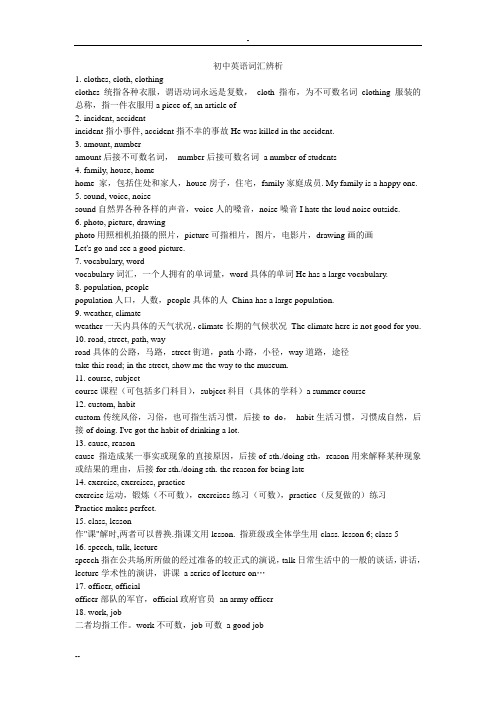
初中英语词汇辨析1. clothes, cloth, clothingclothes统指各种衣服,谓语动词永远是复数,cloth指布,为不可数名词clothing 服装的总称,指一件衣服用a piece of, an article of2. incident, accidentincident指小事件, accident指不幸的事故He was killed in the accident.3. amount, numberamount后接不可数名词,number后接可数名词a number of students4. family, house, homehome 家,包括住处和家人,house房子,住宅,family家庭成员. My family is a happy one.5. sound, voice, noisesound自然界各种各样的声音,voice人的嗓音,noise噪音I hate the loud noise outside.6. photo, picture, drawingphoto用照相机拍摄的照片,picture可指相片,图片,电影片,drawing画的画Let's go and see a good picture.7. vocabulary, wordvocabulary词汇,一个人拥有的单词量,word具体的单词He has a large vocabulary.8. population, peoplepopulation人口,人数,people具体的人China has a large population.9. weather, climateweather一天内具体的天气状况,climate长期的气候状况The climate here is not good for you.10. road, street, path, wayroad具体的公路,马路,street街道,path小路,小径,way道路,途径take this road; in the street, show me the way to the museum.11. course, subjectcourse课程(可包括多门科目),subject科目(具体的学科)a summer course12. custom, habitcustom传统风俗,习俗,也可指生活习惯,后接to do,habit生活习惯,习惯成自然,后接of doing. I've got the habit of drinking a lot.13. cause, reasoncause 指造成某一事实或现象的直接原因,后接of sth./doing sth,reason用来解释某种现象或结果的理由,后接for sth./doing sth. the reason for being late14. exercise, exercises, practiceexercise运动,锻炼(不可数),exercises练习(可数),practice(反复做的)练习Practice makes perfect.15. class, lesson作"课"解时,两者可以替换.指课文用lesson. 指班级或全体学生用class. lesson 6; class 516. speech, talk, lecturespeech指在公共场所所做的经过准备的较正式的演说,talk日常生活中的一般的谈话,讲话,lecture学术性的演讲,讲课a series of lecture on…17. officer, officialofficer部队的军官,official政府官员an army officer18. work, job二者均指工作。
初中英语词汇辨析
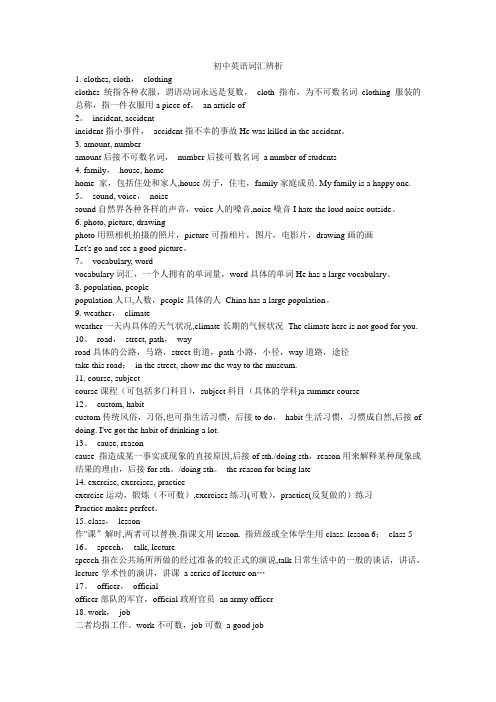
初中英语词汇辨析1. clothes, cloth,clothingclothes统指各种衣服,谓语动词永远是复数,cloth指布,为不可数名词clothing 服装的总称,指一件衣服用a piece of,an article of2。
incident, accidentincident指小事件,accident指不幸的事故He was killed in the accident。
3. amount, numberamount后接不可数名词,number后接可数名词a number of students4. family,house, homehome 家,包括住处和家人,house房子,住宅,family家庭成员. My family is a happy one. 5。
sound, voice,noisesound自然界各种各样的声音,voice人的嗓音,noise噪音I hate the loud noise outside。
6. photo, picture, drawingphoto用照相机拍摄的照片,picture可指相片,图片,电影片,drawing画的画Let's go and see a good picture。
7。
vocabulary, wordvocabulary词汇,一个人拥有的单词量,word具体的单词He has a large vocabulary。
8. population, peoplepopulation人口,人数,people具体的人China has a large population。
9. weather,climateweather一天内具体的天气状况,climate长期的气候状况The climate here is not good for you. 10。
road,street, path,wayroad具体的公路,马路,street街道,path小路,小径,way道路,途径take this road;in the street, show me the way to the museum.11. course, subjectcourse课程(可包括多门科目),subject科目(具体的学科)a summer course12。
初中英语300组常用词语辨析完整版

初中英语300组常用词语辨析Lesson495.bloom/flower/blossomⅠ.bloom指观赏用的花。
如:玫瑰;菊花;牡丹等。
Ⅱ.flower是普通用语。
Ⅲ.blossom指果树上的花。
96.boat/shipⅠ.boat“船、艇,”是普通用语。
主要指用浆、篙、帆或引擎的小船、小艇,但有时也指大轮船。
如:1We crossed the river by boat.我们乘船过河。
2They pulled the boat up on to the shore.他们把这条船拖上了岸。
(指小船③When does the boat leave for Shanghai?(指轮船Ⅱ.ship“船、舰,”多指大的航海船只。
如:1The ship is at sea.船厂在航海。
2They went to Guangahou by ship.他们乘船去广州。
97.bold/brave/courageousⅠ.bold“大胆的、勇敢的”着重指大胆、勇敢的气质,表现出有胆量、敢闯或敢于对抗而不畏缩。
如:1Be bold!勇敢些!2It’s very bold of us to v enture to go to sea.我们冒险航海是很勇敢的。
Ⅱ.brave“勇敢的”,应用最广泛,通常指在危险、困难或可怕的情况下表现勇猛而畏缩。
如:1Be brave!勇敢些!2It was brave of him to enter the burning building.他敢进入那燃烧着的房屋,真是勇敢。
Ⅲ.courageous“勇敢的,无畏的”表示由于有勇敢的气质或不屈不挠的精神而能无畏地自觉地对付某种事情,常常用于表示道义上的勇敢。
如:1He is courageous in telling the truth.他敢于讲实话。
2We hope that they will courageously shoulder their responsibilities and overcome all difficulties.我们希望能够勇敢地负起责任,克服一切困难。
(完整)初中英语词汇辨析
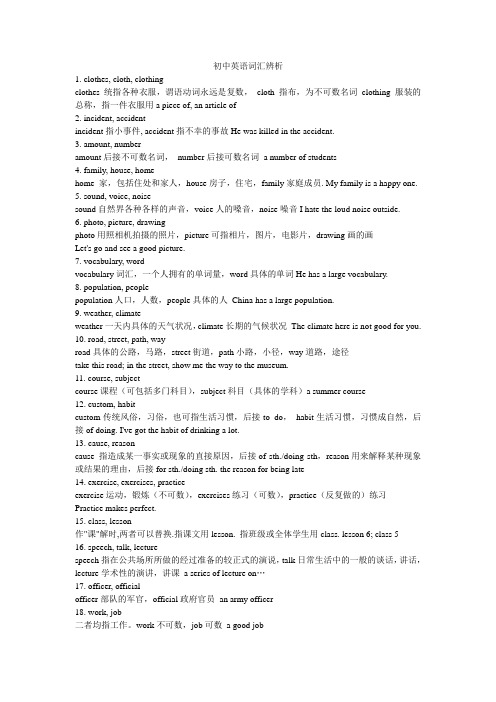
初中英语词汇辨析1. clothes, cloth, clothingclothes统指各种衣服,谓语动词永远是复数,cloth指布,为不可数名词clothing 服装的总称,指一件衣服用a piece of, an article of2. incident, accidentincident指小事件, accident指不幸的事故He was killed in the accident.3. amount, numberamount后接不可数名词,number后接可数名词a number of students4. family, house, homehome 家,包括住处和家人,house房子,住宅,family家庭成员. My family is a happy one.5. sound, voice, noisesound自然界各种各样的声音,voice人的嗓音,noise噪音I hate the loud noise outside.6. photo, picture, drawingphoto用照相机拍摄的照片,picture可指相片,图片,电影片,drawing画的画Let's go and see a good picture.7. vocabulary, wordvocabulary词汇,一个人拥有的单词量,word具体的单词He has a large vocabulary.8. population, peoplepopulation人口,人数,people具体的人China has a large population.9. weather, climateweather一天内具体的天气状况,climate长期的气候状况The climate here is not good for you.10. road, street, path, wayroad具体的公路,马路,street街道,path小路,小径,way道路,途径take this road; in the street, show me the way to the museum.11. course, subjectcourse课程(可包括多门科目),subject科目(具体的学科)a summer course12. custom, habitcustom传统风俗,习俗,也可指生活习惯,后接to do,habit生活习惯,习惯成自然,后接of doing. I've got the habit of drinking a lot.13. cause, reasoncause 指造成某一事实或现象的直接原因,后接of sth./doing sth,reason用来解释某种现象或结果的理由,后接for sth./doing sth. the reason for being late14. exercise, exercises, practiceexercise运动,锻炼(不可数),exercises练习(可数),practice(反复做的)练习Practice makes perfect.15. class, lesson作"课"解时,两者可以替换.指课文用lesson. 指班级或全体学生用class. lesson 6; class 516. speech, talk, lecturespeech指在公共场所所做的经过准备的较正式的演说,talk日常生活中的一般的谈话,讲话,lecture学术性的演讲,讲课a series of lecture on…17. officer, officialofficer部队的军官,official政府官员an army officer18. work, job二者均指工作。
初中英语 词汇辨析总结
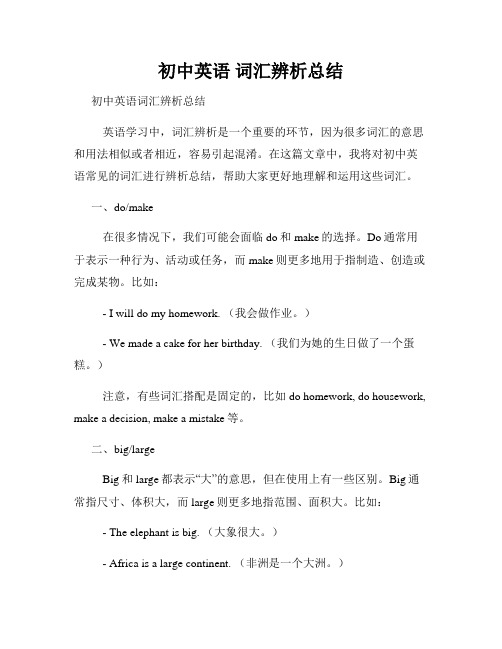
初中英语词汇辨析总结初中英语词汇辨析总结英语学习中,词汇辨析是一个重要的环节,因为很多词汇的意思和用法相似或者相近,容易引起混淆。
在这篇文章中,我将对初中英语常见的词汇进行辨析总结,帮助大家更好地理解和运用这些词汇。
一、do/make在很多情况下,我们可能会面临do和make的选择。
Do通常用于表示一种行为、活动或任务,而make则更多地用于指制造、创造或完成某物。
比如:- I will do my homework. (我会做作业。
)- We made a cake for her birthday. (我们为她的生日做了一个蛋糕。
)注意,有些词汇搭配是固定的,比如do homework, do housework, make a decision, make a mistake等。
二、big/largeBig和large都表示“大”的意思,但在使用上有一些区别。
Big通常指尺寸、体积大,而large则更多地指范围、面积大。
比如: - The elephant is big. (大象很大。
)- Africa is a large continent. (非洲是一个大洲。
)三、happy/gladHappy和glad都表示“高兴的”意思,但在使用上有细微差异。
Happy更通用,可以用于形容各种情绪的高兴,而glad则更强调突发的高兴、出乎意料的喜悦。
比如:- I am happy to see you. (见到你我很高兴。
)- We are glad to hear the news. (听到这个消息我们很高兴。
)四、buy/purchaseBuy和purchase都表示“购买”之意,但buy更常用,更口语化,而purchase则更正式一些。
在日常交流中,我们通常使用buy。
比如: - I bought a new book. (我买了一本新书。
)- He purchased a car last week. (他上周购买了一辆车。
初中词义辨析英语总结
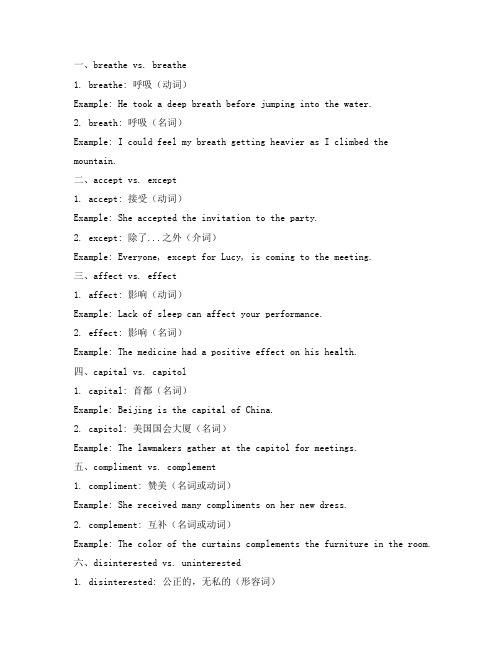
一、breathe vs. breathe1. breathe: 呼吸(动词)Example: He took a deep breath before jumping into the water.2. breath: 呼吸(名词)Example: I could feel my breath getting heavier as I climbed the mountain.二、accept vs. except1. accept: 接受(动词)Example: She accepted the invitation to the party.2. except: 除了...之外(介词)Example: Everyone, except for Lucy, is coming to the meeting.三、affect vs. effect1. affect: 影响(动词)Example: Lack of sleep can affect your performance.2. effect: 影响(名词)Example: The medicine had a positive effect on his health.四、capital vs. capitol1. capital: 首都(名词)Example: Beijing is the capital of China.2. capitol: 美国国会大厦(名词)Example: The lawmakers gather at the capitol for meetings.五、compliment vs. complement1. compliment: 赞美(名词或动词)Example: She received many compliments on her new dress.2. complement: 互补(名词或动词)Example: The color of the curtains complements the furniture in the room.六、disinterested vs. uninterested1. disinterested: 公正的,无私的(形容词)Example: The judge must be disinterested in order to make a fair decision.2. uninterested: 不感兴趣的(形容词)Example: He seemed uninterested in the topic of the conversation.七、hear vs. listen1. hear: 听见(动词)Example: I can hear the birds singing outside.2. listen: 听(动词)Example: Please listen to what I have to say.八、loose vs. lose1. loose: 宽松的(形容词)Example: The dress is too loose for me.2. lose: 失去(动词)Example: I don't want to lose my keys again.九、principal vs. principle1. principal: 校长(名词)Example: The principal gave a speech at the graduation ceremony.2. principle: 原则(名词)Example: He refused to compromise his principles.十、stationary vs. stationery1. stationary: 静止的(形容词)Example: The car remained stationary at the traffic light.2. stationery: 文具(名词)Example: I bought some new stationery for school.以上是初中词义辨析英语总结的相关内容,希望对大家有所帮助。
初中英语易混淆的词语辨析
初中英语易混淆的词语辨析第一组spend/take/cost① 花费的主题通常是“人”,即“某人花费了多少时间或金钱”例句:2)shespentlotsofmoneyonbookslastyear.(去年她花费很多钱在书本上。
)② 做某事需要多长时间1)howlongdoesittakeyoutofinishthework?(你需要多少时间才能完成那工作?)2)ittookmeanhourtorepairmybike.(我花了一个小时修理自行车。
)3)这让我们有足够的时间去了解真相。
说实话需要很大的勇气③cost的主语通常是事物,即指①某物值多少钱②需要多少时间③某人花了多少钱④使(某人)(丧失)(事/物)+cost+(人)+时间/金钱1)thewatchcostmetwohundredyuan.(这块手表花了我200块钱。
)2)写小说要花很多时间。
写小说要花很多时间3)thegirl'sbadbehaviorcostherparentsmanysleeplessnights.(那个女孩的不良行为使得她的父母许多夜晚睡不着。
)注意:cost的过去式,过去分词都是cost。
第二组:说/说/说/说①speak说某种语言,说某人好、坏话是及物动词;发表讲话,对某人说话,是不及物动词。
1)thestudentsspeakenglishveryfluently.(这些学生英语说得非常流利。
)2)总理就国际形势发表了讲话。
(首相就国际形势发表了讲话。
)3)她总是会说话。
她总是说别人的坏话② 一般来说,坦率地说,坦率地说,严格地说,严格地说,不说;更不用说1)generallyspeaking,manisstrongerthanwoman.(一般而言,男人比女人强壮。
)2)我们会说英语,不会说汉语。
我们能读英语,更不用说中文了④say说出某句话或某件事;后接从句,(但say与从句之间不能直接接人称代词或名词);说明时间;书信、布告报纸上的“说”,习惯用法1)shesaid,“iloveyou.”(她说:“我爱你。
初中英语中考常见词汇辨析
be good with “善于应付……的;对……有办法”,常接名词或代词
be good for
“对……有好处”,其反义短语为be bad for/be harmful to,意为“对……有害; 对……有坏处”
be good to “对……好”,其同义短语为be kind/friendly to,后跟名词或代词
talk to/with sb.和某人交谈 talk of/about sth.谈到/谈论某事 talk back回嘴;顶嘴
6.辨析be good at/with/for/to
短语
含义及用法
be good at “擅长……;精通……”,相当于do well in, at后接名词、代词或动词的ing形式
【考点例句】 Alex is very good at languages.亚历克斯在语言方面很擅长。 As a politician, you need to be good with words.当政治家要善于辞令。 Fresh fruit and vegetables are good for you.新鲜的水果和蔬菜对你有好处。 My friend was good to me when I was ill.我生病时我的朋友对我关怀备至。
3.辨析sound, noise与voice
单词 sound noise voice
含义及用法 作名词表示“声音”时,是指自然界各种声音的总称 专指“噪音”或“不悦耳的声音” 指“说话声”或“嗓音”
短语 make a noise make a lot of noise in a loud/high voice in a low voice
7.辨析wear, put on, dress与(be) in
初中英语常用词语辨析
[例]He died two years ago.他是两年前去世的。
before 后接“时间点”,可用于任何时态;它也可放在“时间段”后,
用于完成时或一般过去时。
[例]I got there before 5 o’clock.我五点钟前到达那里。
I never saw him before.我以前没见过他。
(1)相同点:都用来修饰形容词、副词及其比较级,也可修饰动词。
Get up a bit/ a little earlier, and you will see the star.
起早一点你就会看到星星了。
(2)不同点:①a little+不可数名词,a bit of+不可数名词
(2)take意为“带走”,即把某物带到别的地方去。
It’s going to rain. You’d better take an umbrella with you.
要下雨了。你最好带上一把雨伞。
(3)fetch意为“去取来某物”,它包括一个往返的过程。
如:Will you go and fetch some water?你去取一点水来,好吗?
(2)among后接人或物必须是三个或三个以上,在一群、一组或一个整体中间。如:
I saw him among the crowd.我看见他在人群中。
London is among the greatest cities of the world.伦敦是世界上最大的城市之一。
4.borrow/ lend
(1)二者都有“借”的意思,使用时应注意以谁为中心的问题,borrow是
以“我”为中心,“借进”的意思,常与from连用。如:
初中英语常见易混词汇辨析
初中英语常见易混词汇辨析在初中英语的学习中,同学们常常会遇到一些容易混淆的词汇,这些词汇在拼写、发音、词义或用法上有相似之处,给我们的理解和运用带来了一定的困难。
下面就为大家详细辨析一些常见的易混词汇。
一、“a”和“an”“a”和“an”都属于不定冠词,用于泛指一个人或事物。
“a”用于以辅音音素开头的单词前,“an”用于以元音音素开头的单词前。
需要注意的是,这里所说的“元音音素”和“辅音音素”指的是读音,而不是字母。
例如,“a book”(一本书),“an apple”(一个苹果)。
“hour”(小时)这个单词虽然以“h”开头,但“h”不发音,它的读音是以元音音素开头,所以应该说“an hour”。
二、“alone”和“lonely”“alone”表示“独自的,单独的”,侧重于指客观上的独自一人,没有同伴。
“lonely”则表示“孤独的,寂寞的”,侧重于指主观上感到孤独、寂寞,带有感情色彩。
例如,“He lives alone but he doesn't feel lonely”(他独自生活,但并不感到孤独。
)三、“bring”和“take”“bring”意为“带来,拿来”,指把某物从别处带到说话者所在的地方。
“take”意为“拿走,带走”,指把某物从说话者所在的地方带到别处。
例如,“Bring your book here”(把你的书带到这儿来。
)“Take this bag to your room”(把这个包拿到你的房间去。
)四、“in front of”和“in the front of”“in front of”表示“在……前面”,指在某个物体外部的前面。
“in the front of”也表示“在……前面”,但指在某个物体内部的前面。
例如,“There is a tree in front of the house”(房子前面有一棵树。
)“The driver is sitting in the front of the bus”(司机坐在公共汽车的前部。
- 1、下载文档前请自行甄别文档内容的完整性,平台不提供额外的编辑、内容补充、找答案等附加服务。
- 2、"仅部分预览"的文档,不可在线预览部分如存在完整性等问题,可反馈申请退款(可完整预览的文档不适用该条件!)。
- 3、如文档侵犯您的权益,请联系客服反馈,我们会尽快为您处理(人工客服工作时间:9:00-18:30)。
初中英语词语辨析a bit ,a little两个短语均可用来修饰形容词、副词及其比较级,意义一样,可以通用。
e.g.They are feeling a bit/a little tired.他们感到有点儿累。
修饰不可数名词时,a little可以直接连用,但a bit 需要加of,再跟不可数名词。
e.g.I need a little money to buy the book.I need a bit of money to buy the book.我需要一点钱买这本书。
not a little 意为“非常”、“很”,而not a bit则意为“一点也不”。
e.g.He is not a bit engry.他一点也不恼火。
She is not a little hungry.她很饿了。
above,over两词在表示位置关系时,均有“在……上方”的意思,但above表示“斜上方”,反义词为below。
over 表示“正上方”,反义词为under。
表示“越过”时,要用over。
e.g.The plane flew over the city of Nanjing.那架飞机飞越南京城而去。
表示气温、还把的“高于”,一般用above。
e.g.The lowest temperature will be 8℃ above zero tonight.今晚的最低温度将是零上8摄氏度。
over还有“多于”、“超过”的意思,相当于more than。
e.g.Over fifty students are over there.那边有50多个学生。
accept,receiveaccept指有意识的,经过考虑的,意为“接受”receive是无意识的,无法事先考虑,意为“收到”。
e.g.I received a gift from her,but I didn’t accept it.我收到了她给我的礼物,但我没有接受。
across,through这两个词都是“穿过”的意思,介词,across表示穿过某处时,它的左右两边无障碍物,而用through 时,两边有障碍物。
e.g.when they travelled through the forest,they saw many monkeys.他们穿过森林时,看见许多猴子。
We walked across the square and came to the museum.我们穿过广场,来到了博物馆。
说“横过马路”、“横渡江河”均需用介词across,即:across the road,across the river。
ago,before两个词均可用来表达过去的时间,但ago指从现在起往前推算一段时间,始终置于所修饰的词之后,与一般过去时连用。
before或指从过去某一时间起向前推算的若干时间的以前,通常与过去完成时连用;或泛指以前,并不具体指若干时间以前,可使用现在完成的或过去时;还可指从将来某一时间起的若干时间以前。
e.g.I came here two weeks ago,and four days before that I had been in Changsha .两个星期前我来到了这,在此四天前我在长沙。
before还可以放在句末,前面没有段时间,此时befor是副词,意为“以前”,常与现在完成时态连用。
e.g.I have never been to Sichuan before.以前我从未到过四川。
alive,living,live这三个词都是形容词,意为“活着的”。
alive常用作表语(跟在系动词后面的词语叫表语)和后置定语。
e.g.He is the only man alive now.现在他是唯一活着的人。
Those fish are still alive.那些鱼还活着。
living指“活着的”、“现在的”,常用作表语或定语。
e.g.She is still living at the age of 90.她90岁了,还健在。
We should leam a living language.我们应该学习活的语言。
live作形容词解时意为“活着的”“精力充沛的”等,常用作定语。
e.g.It is a live fish.是条活鱼。
She has two live eyes.她有一双炯炯有神的眼睛。
all,whole两个形容词都可做“全部”解,但在句中的词序不同,即:“all the/one’s+名词”,“the/one’s whole”。
e.g.all the teachers in our school are excellent.我们学校的老师都优秀。
His whole time is spent on it.他全部时间都花在这上面。
all强调所有的成员,后面常跟复数可数名词,whole强调“整体”,后面常跟单数可数名词。
e.g.All the Chinese people love peace.全中国人民都热爱和平。
The whole nation was in deep sorrow.全国都陷入了深深悲痛之中。
all还可以修饰不可数名词。
e.g.All her money is gone。
她所有的钱都不见了。
almost,nearly两个均为副词,意为“几乎”、“差不多”,指时间时,两词常可换用。
e.g.It is aimost/nearly dark.天差不多黑了They have almost/nearly enough time.它们的时间差不多够了。
二者的区别:(1)almost可以用在any及否定词“no, no one, nobody, never, nothing, none, nowhere 等的前面,而nearly则不可以。
eg:There is almost no leadership at all.(不可用nearly)但是,nearly可以用在否定词not之后,起加强否定陈述的作用,而almost则不可以。
eg:It's not nearly so nice. We don't do nearly enough to help.(2)almost可以用在以—ly结尾的副词的前面,而nearly则不可以。
eg:She said it almost crossly. Your boss is almost certainly there.(3)almost可以用在like之前,表示“相似,但不完全相同”或避免说得过于肯定;nearly则不可以。
eg:It made me feel almost like a hostess.(4)very,so,pretty可以用在nearly前面,却不可用在almost前面。
eg:We were very nearly at the end Of our journey....the American who so nearly won the Open Championship in 1970.I've pretty nearly finished.not nearly是一个习惯用语,意为“远远不够”。
e.g.There are not nearly enough people here to do the job.这儿的人数远远不够来干这件事。
alone,lonelyalone,形容词,意为“独自一人的”、“单纯的”,作表语,还可以作副词,用作状语;lonely意为“孤独的”、“寂寞的”、“偏僻的”、“荒凉的”,可用作定语,也可用作状语。
e.g.Although she is alone,she doen’t feel lonely.尽管她独自一人,但她不感到孤独。
Done’t worry.I can go alone.别担心。
我可以一个人去。
I was born in a lonely village.我出生在一个偏僻的村子。
aloud,loud,loudly这三个副词都作“大声地”解,但表示的程度不同。
aloud常指“出声”,不一定“大声”,与动词read 连用;loud常用来修饰speak、shout、laugh和talk等动词,表示音量大,传得远;loudly常含有喧闹嘈杂、令人厌烦的意思。
e.g.Please read the passage aloud.请朗读这段文章。
Mr Li,please speak louder so that we can hear you.李先生,请大声点将,以便我们听见你的讲话。
Done’t shout so loudly,will you?请不要大声叫喊,好吗?already,yetalready通常用于肯定句中,用在疑问句中含有惊讶的意思,不能用在否定句中;yet一般情况下用于疑问句和否定句中。
e.g.They have already done that.他们已经做了那件事。
Have they finished their homework already?他们已经做完了家庭作业?She hasn’t decided yet?她还没有决定呢。
—Have you written to her yet?你给她写信了吗?—Not yet.还没有。
从上面句子可知,already和yet常用在现在完成时态中。
also,as well,either,foo这四个词语都作“也”解时。
also多放在实义动词前,用在肯定句中;as well一般放在句末,用在肯定句或疑问句中;too的用法跟as well一样;either作“也”解时,用在否定句中,也放在句末。
e.g.He also went there by bus.他也是乘公共汽车去那的。
This exercise is very difficult to do as well.这道练习题也非常难解。
Are you an engineer,either?你也是一个工程师吗?We mustn’t park our cars here,either.我们也不可以把小车停在这儿。
although,though这两个词意义一样,用来引起让步定语从句,意为“虽然/尽管……但是”,在英语中用了although或though,后面的主句就不可以用but了。
e.g.虽然他年纪小,但他懂几门外语。
【T】Although he is young,he knows several foreign languages.【T】Though he is young,he knows several foreign languages.【T】Young as/though he is,he knows several foreign languages.【F】Although he is young,but he knows several foreign langusges.although和though一般情况下可以换用,但前者语气比后者强些,词序不可以移置,而though可以,这时though可以用as换用。
